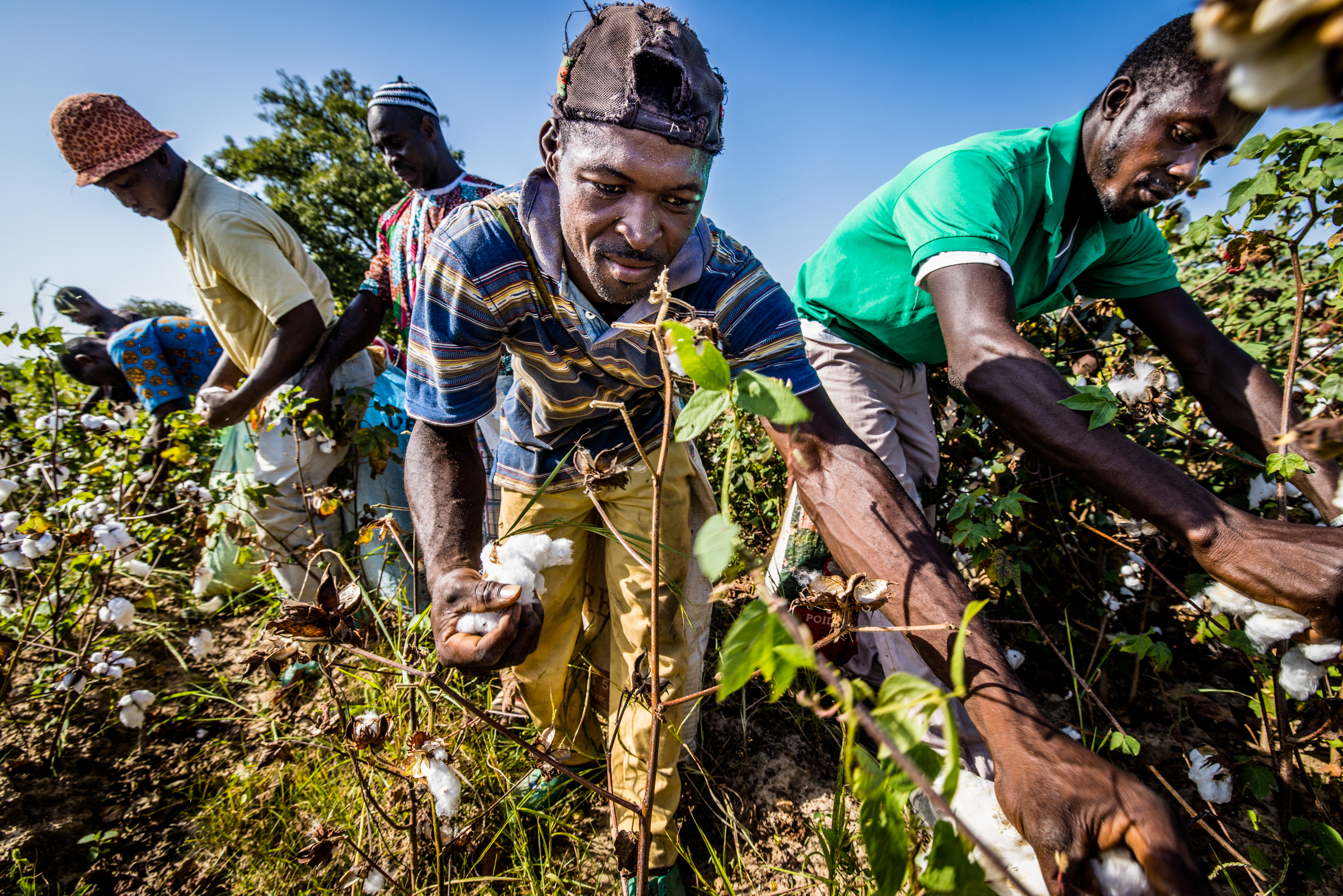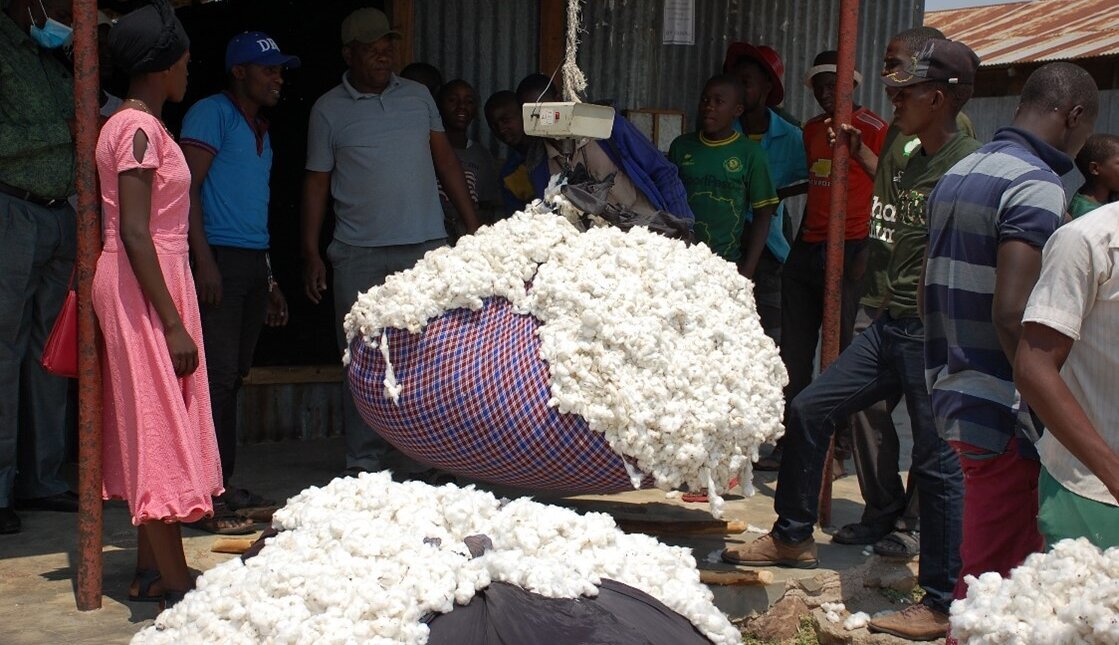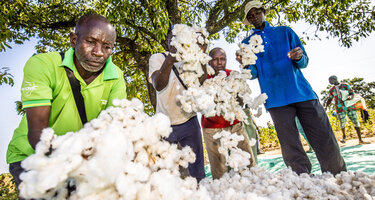Partnerships for Sustainable Cotton – Four Years of the Sub-Saharan Cotton Initiative
Since 2021, the Sub-Saharan Cotton Initiative (SSCI) has been working with partner organisations across seven countries to promote innovative approaches for fairer and more sustainable cotton production. As the four-year initiative comes to a close, one message stands out: collaboration, local knowledge and access to trainings and information are key to climate-resilient farming and stable livelihoods in the cotton sector.
From an Idea to Shared Responsibility
The Sub-Saharan Cotton Initiative began in 2021 as an idea competition. Its goal: to support projects that make cotton cultivation and processing across African producing regions more sustainable, fair and resilient – in close cooperation with those who drive the sector forward.
From many proposals, four projects were selected for implementation in Benin, Côte d’Ivoire, Mozambique, Zambia, Tanzania, Togo, and Chad, with international and local companies as well as civil society investing nearly five million euros in total.
Shared Challenges, Joint Solutions

Smallholder farmers across West, East and Southern Africa face similar challenges: irregular rainfall, soil erosion and rising production costs. These problems are not new – they are deeply linked to global market dynamics and long-standing inequalities in the cotton trade. The SSCI projects responded with hands-on approaches: agroecological methods, income diversification, digital traceability, and peer-to-peer learning across borders.
Four Projects – Many Perspectives
1. Benin – Organic Transformation from the Ground Up
In Benin, the project led by Pesticide Action Network UK (PAN UK) and local partners supported farmers in transitioning to organic cotton cultivation.
“For a good harvest, it’s important to bury the plant residues in the soil – they become fertiliser. Our soil shows that we farm organically,” says Rosaline Okou, a cotton farmer from southern Benin.
The initiative encouraged exchange among producers and laid the foundations for a growing organic cotton movement in the country.
2. Tanzania, Zambia and Côte d’Ivoire – Voices from the Cotton4Impact Project
Under the leadership of Paul Reinhart AG, together with Alliance Ginneries Ltd (Zambia and Tanzania) and Ivoire Coton, the project explored new ways to strengthen knowledge, transparency and traceability in the supply chain. More than 1,200 producers were interviewed to understand what has changed.
“Thanks to Ivoire Coton, I was able to build a house and send my children to school,” reported one farmer from Côte d’Ivoire.
“Through advice and better prices, I was able to buy my own farm,” shared a female farmer from Tanzania.
Nine out of ten respondents stated that their quality of life had improved – through higher prices, better farming methods or reduced costs. However, the survey also revealed structural barriers: high input costs, delayed deliveries and limited access to finance. Producers made it clear that true sustainability can only be achieved through reliable partnerships. Cotton4Impact has established a digital exchange and learning platform to improve communication between smallholder cotton farmers and the ginnery.
3. Côte d’Ivoire, Mozambique and Zambia – CAR-iSMa and the Power of Collective Innovation
The project CAR-iSMa (Climate Adaptation and Resilience in Sustainable Management of Cotton), implemented by the Aid by Trade Foundation and partner companies in three countries, aimed to strengthen soil fertility, promote biodiversity and connect knowledge across regions.
“I wanted to show that you can achieve better yields when you care for the soil,” says João Aquibo, a cotton farmer from Niassa Province, Mozambique.
João tested compost and biochar, experimented with intercropping and achieved twice his previous yield. He now shares his experience with his neighbours – an example of how local innovation can drive change. Teams from Mozambique and Zambia exchanged experiences and developed training materials.
“Such encounters build trust and show that equal knowledge exchange is the foundation of resilience,” explains a trainer from Zambia.
4. Côte d’Ivoire, Togo and Chad – Cooperation for Greater Resilience
Together with Solidaridad West Africa and OlamAgri, farmers and local cooperatives worked to strengthen their resilience to climate and market fluctuations. This included sustainable agricultural trainings and sensitisation on environmental and social issues such as child labour. The project supported the establishment of savings and loan associations to improve access to finance and encourage alternative income-generating activities beyond cotton.

For a good harvest, it’s important to bury the plant residues in the soil – they become fertiliser. Our soil shows that we farm organically
Results and Learning

Across all four projects, more than 250,000 cotton producers were reached through project activities.
- Financial self-organisation: Over 500 Village Savings and Loan Associations (VSLAs), primarily led by women, provided microcredits and enabled members to manage their own investments and diversify their income.
- Agroecological learning: Through Farmer Field Schools and demonstration plots, producers learned from one another, experimenting and sharing practical experiences.
- Soil health: Compost, biochar, crop rotation and regenerative methods reduced the use of chemical fertilisers and strengthened local food security.
- Digital transparency: Mobile apps for traceability made supply chains more transparent and supported information flow to farmers.
Perspectives for the Future
In Benin, a second phase of the organic cotton project has begun; the CAR-iSMa network is sharing its materials with other Cotton made in Africa partners; and Cotton4Impact is using the data collected to improve supply chain practices further.
Final Reflection
When producers, local businesses and international partners act together, a new kind of collaboration emerges – one that moves beyond “support” towards partnership, participation and mutual learning.
The stories of Rosaline, João and Jennifer stand for thousands of others – showing that transformation in cotton production begins where voices are heard and experiences are shared.
